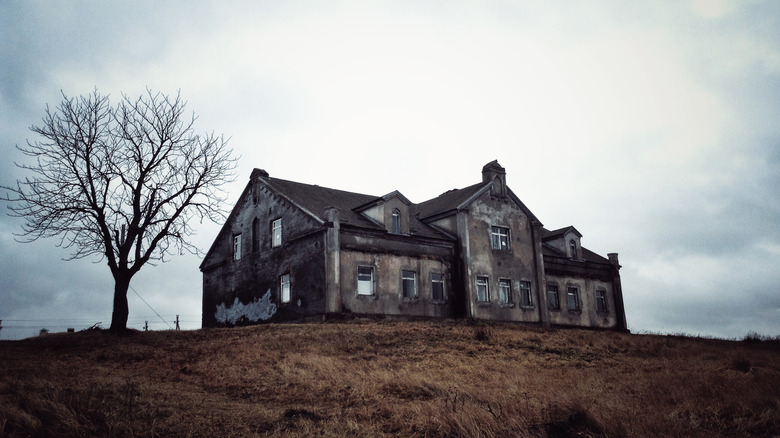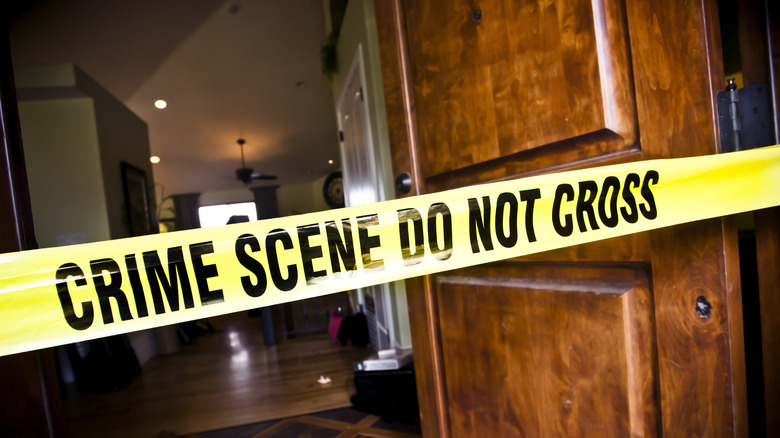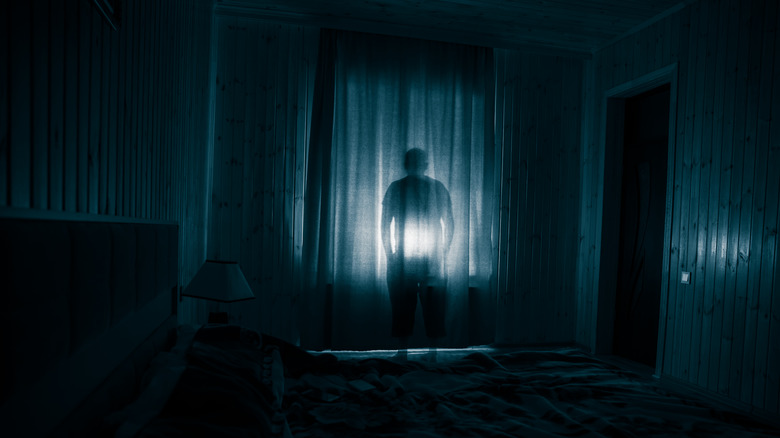What Happens To Famous Murder Houses When They Sell?
So imagine you and a loved one stroll up to a beautiful, picturesque house that makes you nod, smile, and say, "Yeah, I could totally see us living here." You go inside and chat up the realtor because — as luck would have it — that day's an open house. There's a spacious kitchen with enough counter space, a cozy living room with a for-reals fireplace, and enough bedrooms. There's just one problem, the realtor says: "You see that corner right there? Yeah, that's where the previous owner had her face eaten by a cannibal. While she was alive. And then the cannibal killed her and ate the rest, and used her skin to make rolled-up skin shoelaces, Ed Gein style. 'Skin-laces,' I call them. So ... how are we feeling about the place?"
By that little vignette alone, it's easy to imagine that "murder houses" — as they're called — might not be the easiest thing to sell. Sure, maybe there are some Jeffrey Dahmer superfans who would have paid top dollar for his now-demolished apartment-torture den to commune with their favorite serial killer celeb's spirit. But even taking such extremes into account, Realtor.com says that murder houses usually sell for 21% less than their previous sale price. So, hopeful owners might get a deal provided they can live with a house's gory history. In fact, about 59% of all murder houses pass to ordinary buyers, while 20% go to "some kind of corporate entity." Only 8% don't sell, and are taken off the market.
Who died in my closet?
To be fair, not everyone who dies in a house is the victim of some highly publicized, gruesome slaying. People spend much of their lives in their houses — especially later in life — and so loads of homes have housed death. On that note, the bluntly named search site Died in House allows folks to search to see who died of what at which address across the United States. This includes deaths by suicide, murder, and more.
On that note, Realtor.com's sell price percentages take all such deaths into account, not merely the high-profile ones. Aside from murder houses selling for 21% less than their previous price, they also typically sell for 9% less than their listed prices, 15% less than other houses in their zip code, and stay on the market for 47 days longer than non-murder hours (137 days vs. 90 days). Such figures indicate disinterest amongst the public for obvious reasons, but also probably depict less of a difference than many folks would imagine.
As The Guardian describes, some ordinary buyers simply don't mind or care. Homeowner Louise Bloomfield, for instance, calls her house's publicized murder a "part of the heritage of the northeast." She also says, "I always felt her [the victim's] ghost here." Others like Abigail Denton reported similarly, saying, "It doesn't bother us; it's a house, that's it." Auctioneer Andy Thompson, in fact, believes that occupancy by the living is a necessary component to "cleansing" a property.
Torn down, reluctantly bought, or tourist hotspot
As Fox Business illustrates, even the most famous of murder houses follow the typical formula of selling for less than expected, regardless of the intrinsic value of the home. In 1996, for instance, Nicole Brown Simpson's 3,405-square-foot Brentwood, California condo sold for $100,000 less than she had paid for it — an amount almost one-sixth less than her purchasing price of $625,000. The much more lavish mansion of legendary record producer Phil Spector was listed for $5.5 million in March 2019, but got bumped down to about $4.4 million.
Other residences follow the fate of Jeffrey Dahmer's aforementioned apartment 213, the site of murders so grisly that Dahmer's entire building got torn down a mere 15 months after he was discovered. The property containing Ed Gein's 1958 burned-down house was razed afterward, and the University of Idaho murders site was set to face the same fate as of 2023. Lizzy Borden's house, by contrast, has been transformed into a full-blown, active bed-and-breakfast with its own Yelp reviews. Similarly, Insider says that Ted Bundy's former house — not the site of his murders — has been "inundated with murder tourists."
And lest the reader think that only the U.S. suffers from such murder house weirdness, Vice tells a similar story in the U.K.: Murder houses sell, but they sell for less. Some folks don't mind, others speak of "bad vibes," and others swear time heals the wounds of the home.


